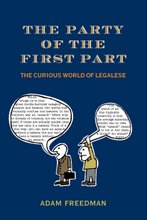Posse
In classical Latin, posse means “to be able to” or “to have power to,” lawyers sometimes use the term in posse, which means “in potentiality.” This is contrasted with in esse (“in existence”). For example: “The term ‘grandchildren’ in the will was interpreted as meaning grandchildren in esse and in posse.” (Random House Webster’s Dictionary of the Law).
But what about the sheriff’s posse? In that usage, posse is short for posse comitatus, which means “the force of the county” (in post-classical Latin, posse took on the meaning of “force”). In English common law, the posse comitatus was every able-bodied man over the age of fifteen in a county, whom the sheriff could summon to quell a riot, to pursue a felon, or – who knows? – maybe even to round out a foursome for bridge. In the UK, the sheriff’s ability to summon a posse remained valid (at least, in posse) until 1967. In various US states, the county sheriff retains this power still. Section 150 of the California Criminal Code, for example, requires that “every able-bodied person above the age of 18” join the posse comitatus when summoned to do so by local authorities. – or face a fine between $50 and $1,000. So be ready to saddle up when duty calls!
(Thanks to Taran Johnston, Ph.D., for inspiring this entry.)


No comments:
Post a Comment